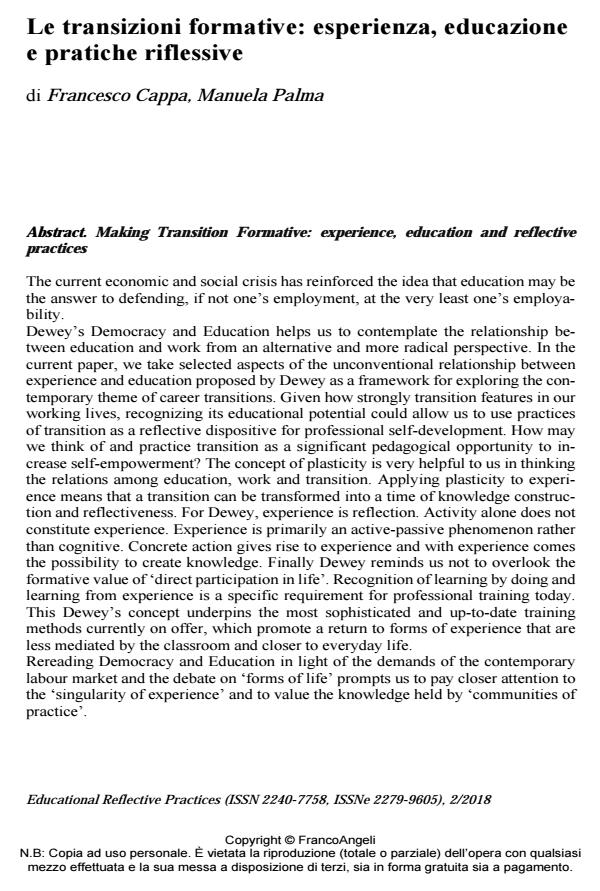Le transizioni formative: esperienza, educazione e pratiche riflessive
Titolo Rivista EDUCATIONAL REFLECTIVE PRACTICES
Autori/Curatori Francesco Cappa, Manuela Palma
Anno di pubblicazione 2019 Fascicolo 2018/2
Lingua Italiano Numero pagine 17 P. 108-124 Dimensione file 220 KB
DOI 10.3280/ERP2018-002008
Il DOI è il codice a barre della proprietà intellettuale: per saperne di più
clicca qui
Qui sotto puoi vedere in anteprima la prima pagina di questo articolo.
Se questo articolo ti interessa, lo puoi acquistare (e scaricare in formato pdf) seguendo le facili indicazioni per acquistare il download credit. Acquista Download Credits per scaricare questo Articolo in formato PDF

FrancoAngeli è membro della Publishers International Linking Association, Inc (PILA), associazione indipendente e non profit per facilitare (attraverso i servizi tecnologici implementati da CrossRef.org) l’accesso degli studiosi ai contenuti digitali nelle pubblicazioni professionali e scientifiche.
The current economic and social crisis has reinforced the idea that education may be the answer to defending, if not one’s employment, at the very least one’s em-ployability. Dewey’s Democracy and Education helps us to contemplate the relationship be-tween education and work from an alternative and more radical perspective. In the current paper, we take selected aspects of the unconventional relationship between experience and education proposed by Dewey as a framework for exploring the contemporary theme of career transitions. Given how strongly transition features in our working lives, recognizing its educational potential could allow us to use practices of transition as a reflective dispositive for professional self-development. How may we think of and practice transition as a significant pedagogical opportunity to increase self-empowerment? The concept of plasticity is very helpful to us in thinking the relations among education, work and transition. Applying plasticity to experience means that a transition can be transformed into a time of knowledge construction and reflectiveness. For Dewey, experience is reflection. Activity alone does not constitute experience. Experience is primarily an active-passive phenomenon rather than cognitive. Concrete action gives rise to experience and with experience comes the possibility to create knowledge. Finally Dewey reminds us not to overlook the formative value of ‘direct participation in life’. Recognition of learning by doing and learning from experience is a specific requirement for professional training today. This Dewey’s concept underpins the most sophisticated and up-to-date training methods currently on offer, which promote a return to forms of experience that are less mediated by the classroom and closer to everyday life. Rereading Democracy and Education in light of the demands of the contemporary labour market and the debate on ‘forms of life’ prompts us to pay closer attention to the ‘singularity of experience’ and to value the knowledge held by ‘communities of practice’
Francesco Cappa, Manuela Palma, Le transizioni formative: esperienza, educazione e pratiche riflessive in "EDUCATIONAL REFLECTIVE PRACTICES" 2/2018, pp 108-124, DOI: 10.3280/ERP2018-002008